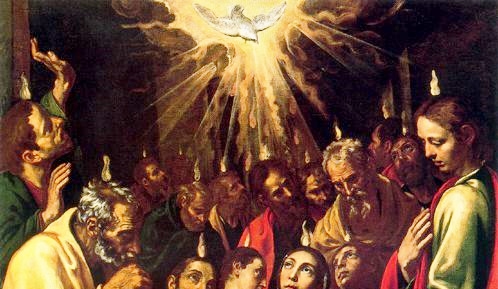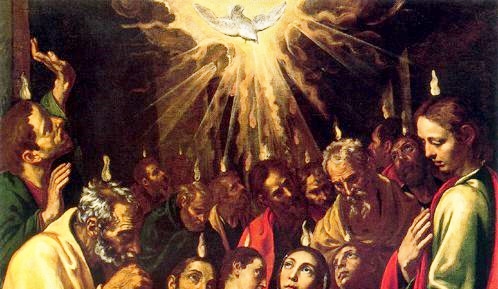
There were three great Jewish festivals to which every male Jew living within twenty miles of Jerusalem was legally bound to come–the Passover, Pentecost and the Feast of Tabernacles. Pentecost means “The Fiftieth,” and another name for Pentecost was “The Feast of Weeks.” It was so called because it fell on the fiftieth day, a week of weeks, after the Passover. The Passover fell in the middle of April; therefore Pentecost fell at the beginning of June. By that time travelling conditions were at their best. At least as many came to the Feast of Pentecost as came to the Passover. That explains the roll of countries mentioned in this chapter; never was there a more international crowd in Jerusalem than at the time of Pentecost.
The Feast itself had two main significances. (i) It had an historical significance. It commemorated the giving of the Law to Moses on Mount Sinai. (ii) It had an agricultural significance. At the Passover the crop’s first omer of barley was offered to God; and at Pentecost two loaves were offered in gratitude for the ingathered harvest. It had one other unique characteristic. The law laid it down that on that day no servile work should be done ( Leviticus 23:21 ; Numbers 28:26 ). So it was a holiday for all and the crowds on the streets would be greater than ever.
What happened at Pentecost we really do not know except that the disciples had an experience of the power of the Spirit flooding their beings such as they never had before. We must remember that for this part of Acts Luke was not an eye-witness. He tells the story as if the disciples suddenly acquired the gift of speaking in foreign languages. For two reasons that is not likely.
(i) There was in the early Church a phenomenon which has never completely passed away. It was called speaking with tongues (compare Acts 10:46 ; Acts 19:6 ). The main passage which describes it is 1 Corinthians 14:1-40 . What happened was that someone, in an ecstasy, began to pour out a flood of unintelligible sounds in no known language. That was supposed to be directly inspired by the Spirit of God and was a gift greatly coveted. Paul did not greatly approve of it because he greatly preferred that a message should be given in a language that could be understood. He in fact said that if a stranger came in he might well think he had arrived in a congregation of madmen ( 1 Corinthians 14:23 ). That precisely fits Acts 2:13 . Men speaking in tongues might well appear to be drunk to someone who did not know the phenomenon.
(ii) To speak in foreign languages was unnecessary. The crowd was made up of Jews ( Acts 2:5 ) and proselytes ( Acts 2:10 ). Proselytes were Gentiles who had accepted the Jewish religion and the Jewish way of life. For a crowd like that at most two languages were necessary. Almost all Jews spoke Aramaic; and, even if they were Jews of the Dispersion from a foreign land, they would speak that language which almost everyone in the world spoke at that time–Greek.
It seems most likely that Luke, a Gentile, had confused speaking with tongues with speaking with foreign tongues. What happened was that for the first time in their lives this motley mob was hearing the word of God in a way that struck straight home to their hearts and that they could understand. The power of the Spirit was such that it had given these simple disciples a message that could reach every heart.
